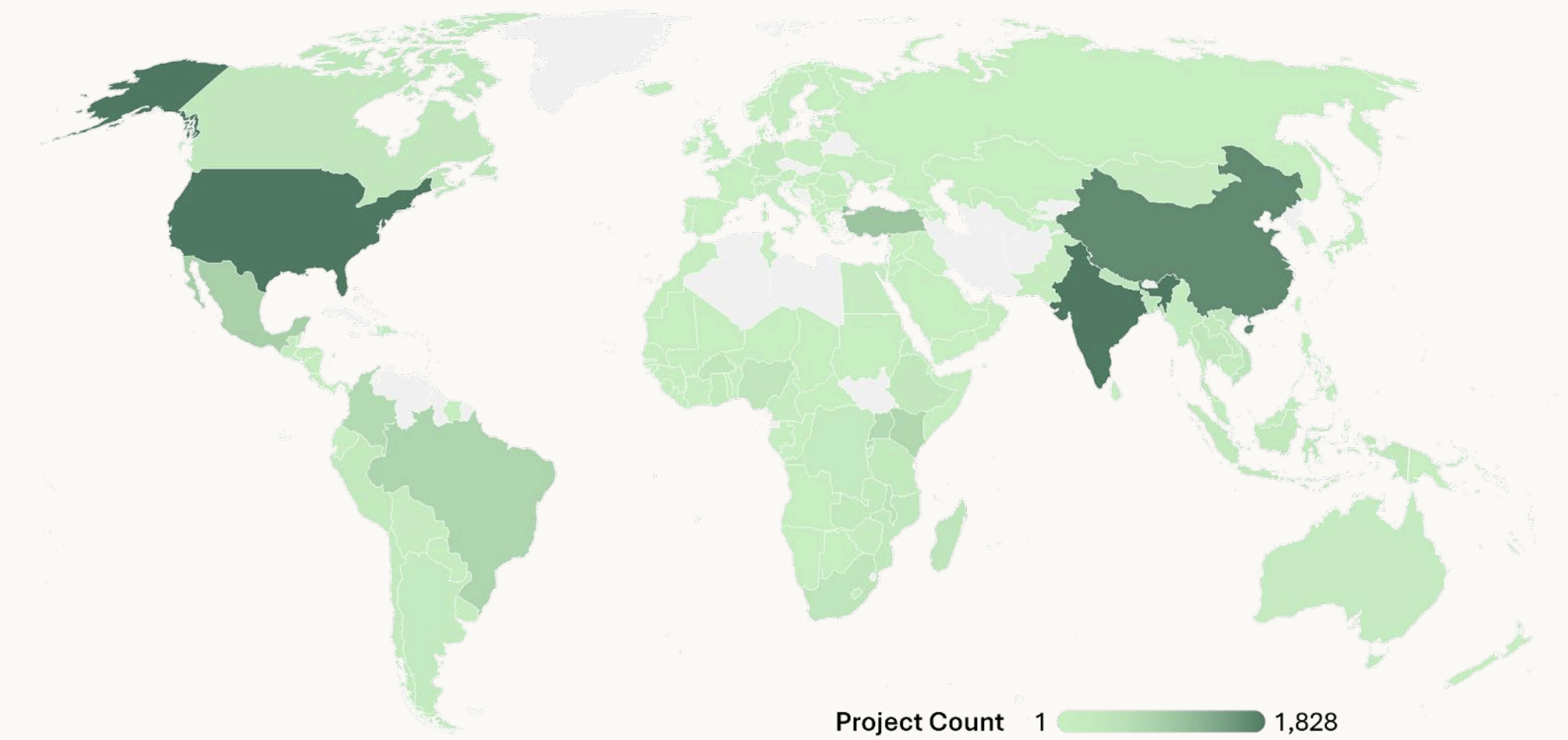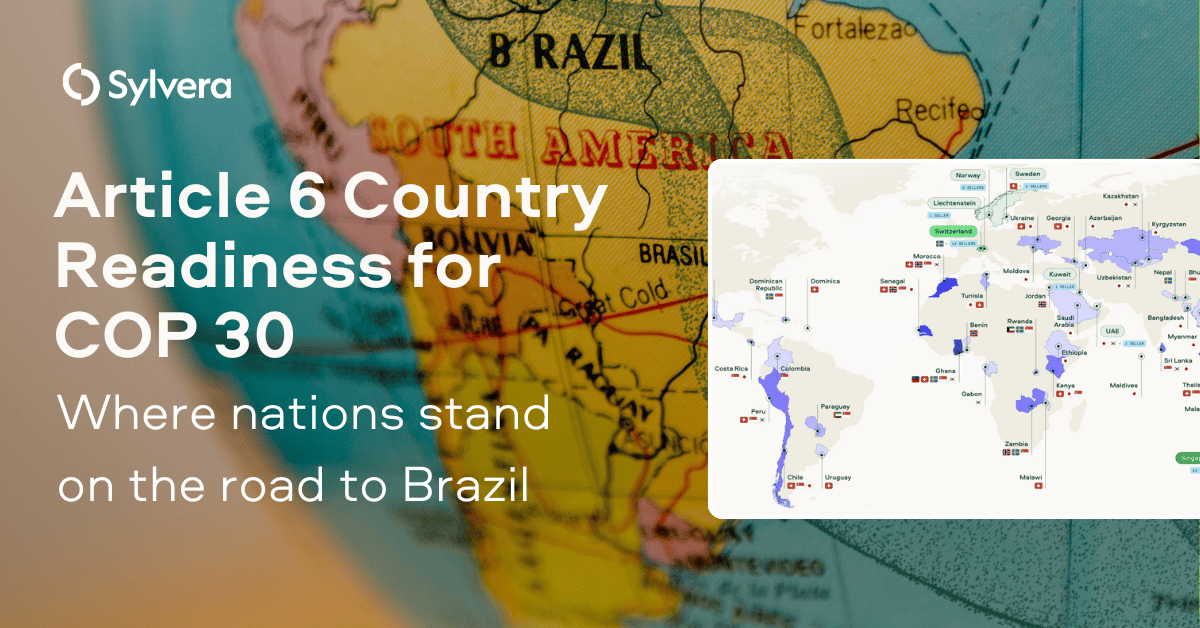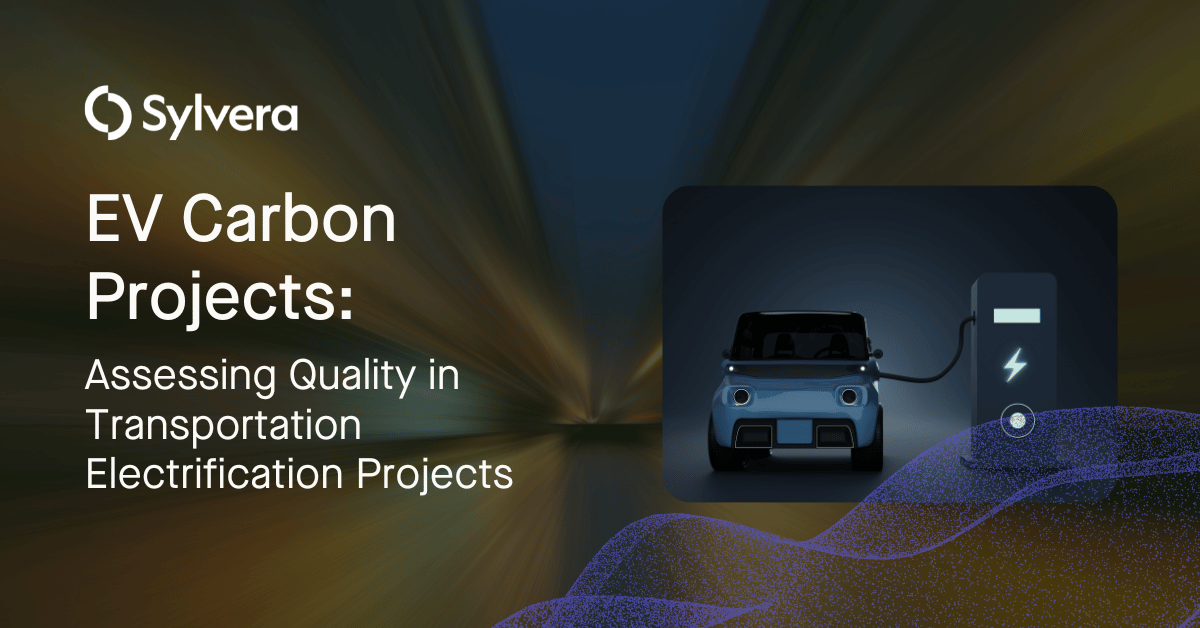“Over the years we’ve invested significantly in our field data team - focusing on producing trusted ratings. While this ensures the accuracy of our Ratings, it doesn’t allow the scale across the thousands of projects that buyers are considering.”
For more information on carbon credit procurement trends, read our "Key Takeaways for 2025" article. We share five, data-backed tips to improve your procurement strategy.

One more thing: Connect to Supply customers also get access to the rest of Sylvera's tools. That means you can easily see project ratings and evaluate an individual project's strengths, procure quality carbon credits, and even monitor project activity (particularly if you’ve invested at the pre-issuance stage.)
Book a free demo of Sylvera to see our platform's procurement and reporting features in action.
The United Nations Framework Convention on Climate Change (UNFCCC) was established in 1992 and now has 198 parties—195 of which adopted the Paris Agreement in 2015.
In November 2025, the 30th UN climate change conference, or Conference of the Parties of the UNFCCC, commonly referred to as COP 30, will take place in Belem, Brazil. The conference will focus on mitigating climate change and each nation's progress towards Paris Agreement standards.
In this article, we examine which of these countries is most ready for Article 6 operationalization.
The Road to COP 30: A Pivotal Moment for Carbon Markets
UNFCCC COP 30 is set to take place in Brazil in November 2025, and government leaders throughout the international community face a crucial point for Article 6 implementation.
Following the landmark agreements reached at COP 29 in Baku, which finalized all remaining components of Article 6, countries now have the political and technical clarity needed to operationalize international carbon markets under the Paris Agreement.
As governments worldwide plan for climate targets and the need for innovative financing mechanisms, Article 6 represents a major opportunity to accelerate climate action. However, success hinges on host country readiness—and current progress reveals a mixed picture with some significant gaps.
Brazil's hosting of COP 30 adds particular significance to this readiness assessment. As a host country with vast forest resources and renewable energy potential, Brazil's own Article 6 trajectory may influence global momentum. The symbolism of achieving substantial Article 6 operationalization by the time the conference opens in the Amazon region on the 10th of November could provide powerful validation for international carbon cooperation.
Current State of Global Article 6 Readiness
Which countries have made the most progress towards Article 6 operationalization? Below, we highlight leading countries, as well as areas where many state governments fall short.
The Leading Pack: Countries Setting the Standard
A small group of nations has emerged as Article 6 readiness leaders, demonstrating what comprehensive preparation looks like in practice.
Ghana stands out as perhaps the most advanced host country, having developed a detailed national framework that explicitly links Article 6 activities to conditional NDC measures while establishing clear positive and negative activity lists. Ghana's approach includes structured benefit-sharing mechanisms and has already issued multiple Letters of Authorization under its Implementation Agreement with Switzerland.
Cambodia recently joined the leadership tier by submitting its Initial Report to the UNFCCC in April 2025, clearly outlining its institutional arrangements with the Ministry of Environment as the designated competent authority. The country's operational manual sets out comprehensive Article 6 processes and includes innovative benefit-sharing provisions, such as reserving up to 10% of authorized mitigation outcomes for national use.
Thailand has achieved a different kind of leadership through operational success, becoming the first country to complete actual ITMO transactions. In December 2023, Thailand transferred 1,916 ITMOs to Switzerland from its Bangkok electric bus program, the world's first ever ITMO trade, followed by an additional 29,222 ITMOs a year later. This real-world implementation demonstrates the practical viability of Article 6 mechanisms.
Kenya has distinguished itself through progressive benefit-sharing regulations, mandating that land-based carbon projects allocate at least 40% of net earnings to community beneficiaries, while non-land-based projects must allocate 25%. This framework provides strong safeguards and predictability for local communities.

The Engaged Middle: Countries Building Momentum
A broader group of approximately 30 countries has signed bilateral agreements or memoranda of understanding, indicating serious intent to participate in Article 6. Notable examples include:
- Rwanda and Madagascar, which have issued unilateral Letters of Authorization for carbon projects certified under independent standards
- Uganda, Ghana, Myanmar, and Bangladesh, which have approved multiple Clean Development Mechanism activities for transition to the Paris Agreement Crediting Mechanism
- Indonesia, Colombia, and Chile, which have integrated carbon credit acceptance into their domestic compliance carbon pricing systems
The Challenge: Widespread Gaps in Readiness
Despite expressions of interest from over 100 countries in their Nationally Determined Contributions, actual readiness remains limited. Only nine countries have submitted Initial Reports to the UNFCCC's Centralized Accounting and Reporting Platform (CARP), and many nations lack the fundamental institutional arrangements needed for Article 6 participation.
Key readiness gaps include:
Institutional Weaknesses: Many countries lack designated competent authorities or clear coordination mechanisms between relevant ministries. Without these foundational elements, countries cannot issue Letters of Authorization or manage international transactions effectively.
Infrastructure Deficits: Robust monitoring, reporting, and verification (MRV) systems aligned with Paris Agreement requirements remain absent in many potential host countries. This creates significant barriers to environmental integrity and buyer confidence.
Regulatory Uncertainty: While at least six countries have published formal Article 6 frameworks, many others operate without clear legal foundations for international carbon market participation.
Capacity Constraints: Technical capabilities for applying corresponding adjustments, managing registries, and meeting Enhanced Transparency Framework obligations pose ongoing challenges, particularly for Least Developed Countries.
Download the complete Host Country Article 6 Readiness: Key Aspects to Drive Demand report for detailed country assessments, implementation frameworks, and actionable guidance to accelerate your Article 6 journey before COP 30.

The COP 30 Imperative: What Countries Must Accomplish
Individual countries must make concentrated efforts to prepare for COP 30. They should also take advantage of strategic opportunities. We examine these things below:
Immediate Priorities
Countries serious about Article 6 participation must focus on foundational readiness elements:
- Submit Initial Reports: The remaining 90+ interested countries need to demonstrate compliance with participation requirements through formal UNFCCC submissions.
- Establish Institutional Frameworks: Designating competent authorities and defining clear roles across government agencies is essential for operational readiness.
- Develop National Frameworks: Countries must translate UNFCCC requirements into nationally applicable rules and processes, following examples set by Ghana, Cambodia, and others.
- Build Technical Capacity: Investing in monitoring, reporting, and verification systems aligned with Paris Agreement requirements.
Strategic Opportunities
The runway to COP 30 presents opportunities for more advanced positioning:
- Pilot Implementation: Following Thailand's example, countries should pursue pilot activities to demonstrate operational capability and build practical experience.
- Bilateral Agreement Development: Expanding the current network of 30 bilateral agreements to include more buyer-seller partnerships.
- Integration with Domestic Policies: Aligning Article 6 activities with national climate legislation, carbon pricing systems, and sectoral strategies.
- Stakeholder Engagement: Building support among local communities, civil society, and private sector participants.
The Lagging Majority: Critical Interventions Needed
For countries still in early readiness stages, the COP 30 timeline demands urgent action:
- Least Developed Countries in Africa and Small Island Developing States need targeted technical assistance and capacity-building support
- Major emerging economies with significant mitigation potential must clarify their Article 6 positioning and regulatory approaches
- Countries with abundant natural climate solutions need frameworks to unlock forest and land-use sector participation
Brazil's Role as COP 30 Host
As COP 30 host, Brazil faces unique pressures and opportunities to demonstrate Article 6 leadership.
The country's vast forest resources, renewable energy potential, and existing carbon market experience position it as a potential showcase for effective implementation.
Brazil's own readiness trajectory—including progress on institutional arrangements, benefit-sharing mechanisms, and indigenous rights protections—will likely influence global perceptions of Article 6 viability. Sadly, the country has already been criticized for its approach to the conference.
Earlier this year, it was revealed that the government of Brazil authorized construction on a new four-lane highway that will cut through thousands of acres of Amazon rainforest to ease traffic to COP 30, which is expected to attract 50,000 additional people to Belem. (Indeed, the city is preparing for the influx of people by building new hotels and even contracting cruise ships.)
The Brazilian president says the conference will shine a light on the needs of the Amazon, but critics worry about deforestation and how the highway will impact local communities and biodiversity.
While the highway is unfortunate, we still hope the Brazilian state government can demonstrate effective Article 6 leadership, given its unique environment.
Unlock Your Country's Article 6 Potential
The weeks leading up to COP 30 represent a critical opportunity for countries to build Article 6 readiness and capture growing carbon market demand.
Whether you're a state official, capacity-building non-governmental organization, or private sector stakeholder, understanding current readiness gaps and best practices is essential for participation.
Looking for a practical way to navigate Article 6 risk? Use Sylvera to evaluate and contrast risk profiles for carbon credit projects in various countries. Then take advantage of our industry-leading Pre-Issuance Ratings and Ratings to purchase high-quality credits that further your climate goals.
Request a free demo of Sylvera today to learn how our platform can help your company thrive in the carbon credits market.











